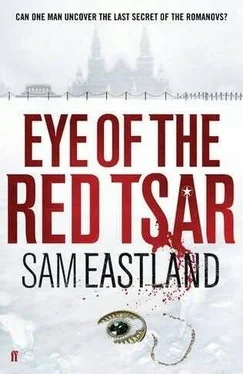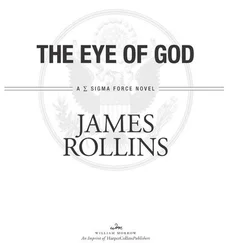The Vodovenko Sanitarium stood by itself on the top of a windswept hill. Only one road led to and from the towering stone structure. The entire hill was stripped of vegetation and all the land around it had been ploughed.
“Why did they do that?” asked Kirov. “Are they planting crops?”
It was Anton who replied. “They do that so the footsteps of anyone who escapes can be tracked across the ground.”
They arrived at a checkpoint at the base of the hill.
Armed guards inspected their papers, raised the yellow-and-black barrier pole, and allowed them to proceed.
Two steel doors at the entrance to Vodovenko swung open. The Emka rolled into a courtyard.
The walls of the sanitarium seemed to lean out over them. In front of each window, secured by bolts a hand’s length from the wall, large metal plates blocked any view.
Kirov cut the engine.
They had not expected the silence, but it was not the silence of an empty place. Instead, it seemed as if everything contained within that massive building was holding its breath.
At the front desk, an attendant reexamined their documents. He was a wide-faced man with a tangle of red hair and rust-colored freckles constellationed on his cheeks. His nose had been broken and healed crookedly. The attendant pulled out a file and slid it across the counter.
Pekkala saw a photograph of a haunted-looking man stapled at the top left corner, and a name written across the top-Katamidze.
The attendant picked up a phone and ordered the patient to be brought to a secure room.
Pekkala wondered what he meant by secure, in a place which was already a prison.
“You will need to surrender your weapons,” the attendant told them.
Two Tokarevs and the Webley clanked down on the countertop.
The attendant behind the desk looked at the Webley. He glanced at Pekkala but said nothing. The guns were placed in a metal cabinet. Then the attendant walked around to a set of metal doors, slid back a dead bolt, and nodded for them to go through.
Pekkala turned to Anton and Kirov. “Wait here,” he said.
Anton looked relieved.
“I don’t mind coming in,” said Kirov. “I would actually-”
“No,” said Pekkala.
Anton tapped Kirov on the shoulder. “Come on, Junior Man. Let’s go outside and you can smoke that fancy little pipe of yours.”
Kirov glared at him, but did as he was told.
When Pekkala stood on the other side of the armored door, the attendant followed him in and dead-bolted it with a key which he kept on his belt.
With his first step into the corridors of Vodovenko, Pekkala began to sweat. It started with the floors, which were covered with thick gray felt. They drank up the noise of their footsteps and seemed to leach from their bodies even the patient drumming of their hearts. Flooding his senses were the smells of coal tar soap, of food boiled into a pulp, of excrement. Fusing it all together was the distinctive reek of sweat from people living in fear.
The corridors were lined with doors. Duck-egg blue paint clung in layers to the metal. All of them were closed and each had an observation slit, covered with a slide. Beneath the observation slit, like an unsmiling mouth, each door also had a slot for passing through food.
Pekkala stopped. His legs refused to move. Perspiration dripped off his jawline. His breath felt hot as cinders in his throat.
“Are you all right?” asked the attendant.
“I think so,” replied Pekkala.
“You have been here before,” the attendant said. “Here or some place like it. I know the look you people get when you come back.”
The attendant led him to a room two stories underground. It had a low ceiling, barely a handsbreadth above the top of Pekkala’s head. A metal chair stood in the exact center of the room. It was anchored to the concrete floor with L-shaped brackets, through which bolts had been driven into the floor.
The only light in the room came from the ceiling directly above the chair, where a naked bulb hung in a metal cage.
A man sat in the chair, chained by each wrist to the forward legs. He was a tall man, and the way he had been chained caused him to stoop over in a manner which reminded Pekkala of a sprinter crouched before the beginning of a race.
Dirty, graying hair stuck out on the sides of his head, leaving a wide sweep of baldness in between. His ears were large, as was his soft, round chin, speckled with a two days’ growth of beard. The man’s eyes, set into a shallow brow, were as smoky blue as those of a newborn baby.
Katamidze wore the same beige cotton pajamas which Pekkala had worn at the outset of his journey to the Gulag. He recalled the humiliating thinness of the cloth, the way it stuck to the backs of his legs when he sweated, and the perverse absence of a drawstring, so that a prisoner had to hold up his pants all the time.
“Katamidze,” said the attendant, “I have someone to see you.”
“This isn’t my usual cell,” replied the man.
“Now then, Katamidze,” crooned the attendant. “Do you see the man I’ve brought to meet you?”
“I see him.” His gaze fixed on Pekkala. “So you are the Emerald Eye?”
“Yes,” said Pekkala.
“Prove it,” said Katamidze.
Pekkala turned up his lapel. In the glare of the metal-caged bulb, the emerald flashed.
“They told me you were dead.”
“A slight exaggeration,” replied Pekkala.
“I said I’d only speak to you.” Katamidze looked at the attendant. “In private.”
“Very well,” said Pekkala.
“I am not authorized to leave you alone with the patient,” the attendant protested.
“I won’t talk to anyone but the inspector,” said Katamidze. After he had finished speaking, his mouth continued to move, but without making any sound.
Pekkala watched the words which formed upon the prisoner’s lips and realized that Katamidze was repeating the last few words of every sentence, like an echo of himself inside his head. He also noticed that the right ankle and left wrist of the prisoner were badly swollen where he had been chained to the wall of his cell.
“It’s against regulations,” the attendant persisted.
“Go,” replied Pekkala.
The attendant looked as if he were about to spit on the floor. “Fine, but this man is classified as dangerous. Stay away from him. I won’t be held responsible for what he’ll do to you if you come too close.”
When the two men were finally alone, Pekkala sat down on the floor with his back to the wall. He did not want Katamidze to feel as if he were being interrogated.
“What season is it now?” asked Katamidze.
“Nearly autumn. The leaves are beginning to turn.”
A smile flickered across Katamidze’s face. “I remember the smell of the leaves on the ground after the first frost. You know, I had begun to believe them when they told me you were dead.”
“I was, in a manner of speaking.”
“Then you should thank me, Inspector Pekkala, for bringing you back from the world of the dead! And now you have something to live for.”
“Yes,” said Pekkala, “I do.”
Ilya and Pekkala stood on the crowded railway platform of the Nikolaevsky station in Petrograd.
It was the last week of February 1917.
Entire army regiments-the Volhynin, the Semyonovsky, the Preobrazhensky-had mutinied. Many of the officers had already been shot. The clattering of machine-gun fire sounded from the Likjeiny Prospekt. Along with the army, striking factory workers and sailors from the fortress island of Kronstadt began systematically looting the shops. They stormed the offices of the Petrograd Police and destroyed the Register of Criminals.
The Tsar had finally been persuaded to send in a troop of Cossacks to battle the Revolutionaries, but the decision came too late. Seeing that the Revolution was gaining momentum, the Cossacks themselves had rebelled against the government.
Читать дальше










